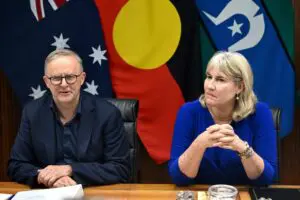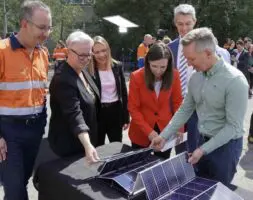Former prime minister Malcolm Turnbull says his biggest regret from his time as leader was his failure to successfully introduce policies to deal with climate change.
There has been renewed focus on the leadership of Malcolm Turnbull following the release of a memoir in which he does not hold back criticism of the right-flank of the Liberal-National Coalition which twice deposed him as leader over the issue of climate change.
“Australia really needs to address climate change. The need is more obvious than ever. We’ve battled the forces of climate denialism in our Parliament and in our political life,” Turnbull said in an interview with Triple J’s Hack Program.
Turnbull lost the prime ministership in August 2018 after shelving his proposed National Energy Guarantee, a move brought about by a rebellion from within the Coalition’s conservative flank and which exposed Turnbull as lacking control over his own party room.
Turnbull, along with then energy and environment minister and now treasurer Josh Frydenberg, had led the development of the National Energy Guarantee as the government’s proposed solution to reducing greenhouse gas emissions.
The National Energy Guarantee was an evolution of the Clean Energy Target that had been proposed by chief scientist Dr Alan Finkel, which both Turnbull and Frydenberg knew was not going to win support from the Coalition backbench and was facing growing opposition from the coal sector.
Despite the evolution, many considered the National Energy Guarantee to be an emissions intensity scheme in disguise that would still effectively provide a price signal on carbon emissions and so attracted the ire of the Coalition’s conservative fraction.
Despite this, the National Energy Guarantee had wide ranging support from the energy and business communities, which were – and continue to be – desperate for a settled policy on reducing emissions.
As Turnbull outlines in his book ‘A Bigger Picture’ there were at least eight coalition MPs who had reserved their right to cross the floor, which would have fatal to the legislation.
“There’s never been an energy policy with a broader base of support than the NEG. The only source of opposition remained within the Liberal and Nationals parties… the question remained whether we could get enough support to be able to get the NEG passed through the House of Representatives,” Turnbull writes.
The faction, which included the likes of former prime minister Tony Abbot, now resources minister Keith Pitt and a collection of backbenchers including Craig Kelly, George Christensen, Kevin Andrews and Andrew Hastie, who were all members of a pro-coal ‘Monash Forum’.
According to Turnbull, members of this group demanded that $5 billion be set aside to support the development of new coal-fired power stations.
Turnbull hits out at this group, which had been agitated by leadership challenger and home affairs minister Peter Dutton, whom he labelled as “terrorists” within the party aided by conservative News Corp publications.
“The Liberal Party has been held hostage by a toxic alliance in the party that oppose climate change, supported by their friends in the media,” Turnbull told Triple J.
“Particularly the Murdoch media and the shock jocks and of course the fossil fuel lobby.”
With several members threatening to cross the floor in parliament if Turnbull ever attempted to legislate the National Energy Guarantee, Turnbull baulked and shelved the plan.
Turnbull says that he was talked out of pushing ahead with the legislation, which would have forced the backbenchers to publicly show their split from the agreed party position.
“My initial instinct was to introduce the bill and stare the wreckers down – let them cross the floor and be seen to do so. But the cabinet was vehemently opposed to this. And not just those on the right. Pyne and Frydenberg were as opposed as Morrison and Dutton,” Turnbull says.
Turnbull subsequently wavered on setting the government’s 2030 Paris Agreement targets in legislation, telling backbenchers Andrew Hastie and Michael Sukkar that he would instead set them by legislation.
At that point, with the perception that he was backing away from the Paris Agreement targets, confidence in Turnbull’s leadership was lost and within the week he was replaced by Scott Morrison, who has since abandoned any pretence of introducing any further measures to curb Australia’s emissions.
Turnbull had to abandon the National Energy Guarantee and focus on attempting to salvage his own leadership. But within days, he would be deposed.
Turnbull, however, doesn’t believe he completely failed on energy policy, pointing to the Snowy 2.0 expansion as a key part of his legacy as prime minister, writing that he believes the project “was the single most important and enduring decision of the many I made on energy”.
“There are a lot of things you do in government that are worthy, but frankly, are fairly obvious responses to the circumstances of the time. Snowy 2.0 was a project that wouldn’t have been resurrected by anyone else.”
But the loss on the National Energy Guarantee will go down on record as bringing about the end of this leadership. The whole process was a virtual replay of the manner in which Turnbull was deposed as leader of the Liberal Party in 2009, also over a proposed climate policy.
As opposition leader, Turnbull had been on the cusp of negotiating a deal with then prime minister Kevin Rudd to pass the Carbon Pollution Reduction Scheme (CPRS) emissions trading package.
Facing a similar rebellion from conservative Coalition senators, Turnbull lost his position as opposition leader, being replaced by Tony Abbott who subsequently won the 2013 federal election.
Turnbull was never able to win the full support of the Coalition party room, with many viewing Turnbull as too closely ideologically aligned with more progressive parties.
Turnbull told the National Smart Energy Summit in December, that the right faction within the Liberal party ‘no longer accepts the premise of a political party’ and that it was too willing to rebel, rather than show solidarity behind an agreed policy position.
RenewEconomy and its sister sites One Step Off The Grid and The Driven will continue to publish throughout the Covid-19 crisis, posting good news about technology and project development, and holding government, regulators and business to account. But as the conference market evaporates, and some advertisers pull in their budgets, readers can help by making a voluntary donation here to help ensure we can continue to offer the service free of charge and to as wide an audience as possible. Thankyou for your support.










